Sono trenta i giovani laureati che riceveranno i Diplomi di Master of Science del CIHEAM Bari. La cerimonia si svolgerà nell’Aula Magna del Campus Cosimo Lacirignola, il prossimo 23 ottobre, alle ore 16.
Un aspetto pregevole di questa cerimonia è l'equilibrio di genere che emerge chiaramente tra i laureati, con un numero significativo di donne. Su un totale di 30 studenti, ben 19 sono donne, a dimostrazione dell’impegno del CIHEAM Bari nel promuovere la parità di genere anche all’interno dei programmi di formazione.
Provenienti da dodici Paesi (Albania, Algeria, Bosnia, Egitto, Etiopia, Haiti, Kosovo, Libano, Marocco, Montenegro, Tunisia e Turchia), i giovani laureati hanno frequentato con successo i corsi di specializzazione post-universitaria in Agricoltura biologica mediterranea, Approcci e tecnologie innovative per la difesa integrata delle colture ortofrutticole mediterranee e Gestione sostenibile del suolo e delle risorse idriche in agricoltura.
Sette di loro hanno svolto la ricerca nel loro Paese d'origine, mentre gli altri ventitré hanno lavorato in Italia, nella sede italiana del CIHEAM Bari e in alcune istituzioni partner. La collaborazione internazionale è stata resa possibile grazie alla cooperazione con le Università di Banja Luka e Sarajevo in Bosnia-Erzegovina, di Damanhour in Egitto, di Prizen in Kosovo, di Addis Abeba in Etiopia, di Tirana in Albania, della Basilicata e di Sassari in Italia e con il Centro di Ricerca Agricola di Giza in Egitto.
Nel contesto attuale in cui la parità di genere è sempre più riconosciuta come un obiettivo prioritario, il CIHEAM Bari non solo ribadisce il suo impegno nella promozione di tale uguaglianza, ma grazie alla sua rete internazionale, fornisce un sostegno significativo agli studenti nel perseguire la ricerca e una carriera di eccellenza.
Il direttore del CIHEAM Bari, Maurizio Raeli, afferma con orgoglio: «I nostri studenti sono i nostri ambasciatori nel mondo, pertanto ci dedichiamo costantemente al perfezionamento dei nostri programmi di studio e a tutte le iniziative che garantiscono una transizione più agevole nel mondo del lavoro».
La cerimonia di consegna dei diplomi è un momento di celebrazione di questi successi, evidenziando il talento e la dedizione di donne e uomini che lavorano insieme per affrontare le sfide del Mediterraneo.
CIHEAM Bari hosted the 2023 edition of the RISE-ATTER Autumn School, a residential training initiative co-organised with Schola Campesina and LAG Alto Salento 2020, which brought together 9 researchers and practitioners from France, Italy, UK and USA.
In Alto Salento (Puglia, Southern Italy), one of the 16 territorial case studies of the ATTER project, the participants were able to observe, discuss and reflect on the multiple dimensions of agroecological transition (AE) by visiting farms, exchanging with local producers of different sex and age, and meeting with various local institutions. A participatory learning dynamics organised with the support of LAG Alto Salento 2020, facilitated by Schola Campesina and structured around the application of the TAPE-Tool for Agroecological PErformance, the global analytical framework for multidimensional evaluation of Agroecology Performance developed by FAO.
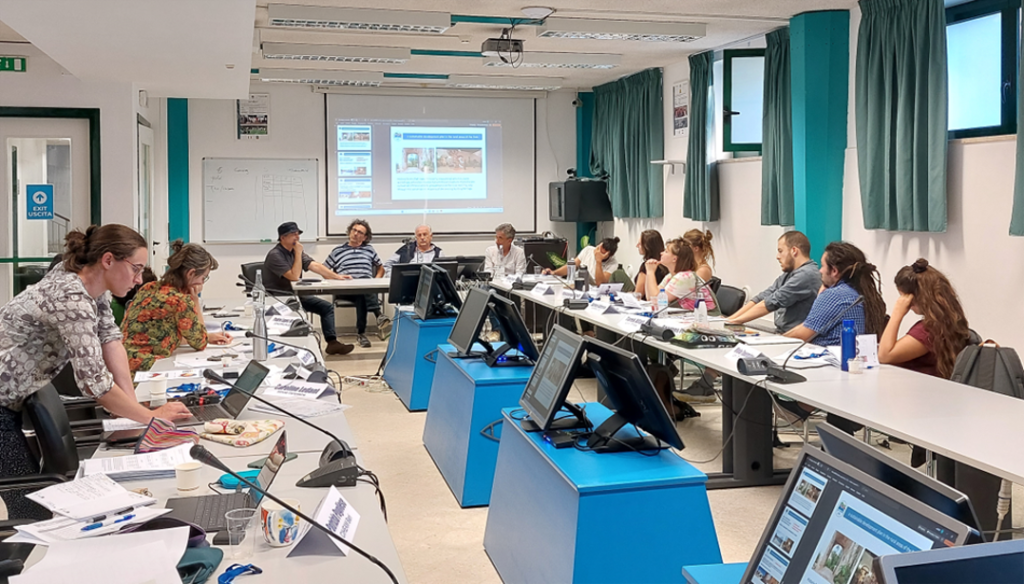
The practical and critical application of TAPE's analytical steps provided trainees, local actors and facilitators with an open space for dialogue, for an engaging interplay of knowledge co-generation and active community building, where participants' diverse backgrounds, competencies, experience and views about AE evaluation crossed paths with the personal and business stories of local actors, vivid concerns for current major threats - such as Xylella devastation, invasive touristification, institutional desertification - and with strategies for coping with an uncertain future.
In the horizontal, informal learning approach adopted in the school, personal reflexivity was given a central role through a running thread of moments designed and facilitated by a professional learning enhancer from Coventry University.
The full-immersion week, preceded by an online introductory seminar by an INRAE expert, was enriched by expert inputs from the University of Pisa and FAO, aiming respectively to broaden and deepen the training focus. A concluding post-school reflexive session is due to take place online next November.
Following the positive results of the last three editions of CIHEAM Bari Master's Programme in ‘Open Innovation and Youth Entrepreneurship in Mediterranean Agri-Food Systems’, with more than 40 participants from 15 countries, the idea of launching a joint Master's Degree in Albania - a member country of CIHEAM - on the same innovative theme was presented to the Rector of the Agricultural University of Tirana, Fatbardh Sallaku, by a delegation that included CIHEAM Secretary General Teodoro Miano, the coordinator of CIHEAM Bari Master’s Programme and head of the Innovation Ecosystem and Youth Entrepreneurship area, Damiano Petruzzella, the head of the Education Office, Olimpia Antonelli, and the representatives of the University of Bari, Alessandro Rubino, Rector's Delegate for Internationalisation, and Maria De Angelis, Director of Di. S.S.P.A.The exchange focused on the pathway towards the implementation of the Master’s Degree and the definition of the first steps of this ambitious initiative aimed at attracting participants from Albania and other Western Balkan countries.
The students are expected to study together and face the challenges of Albanian private sector companies. They will receive a co-delivered international Master's Degree. The main objective of the programme is to train innovation managers in the agri-food sector.
The Advanced Course in Organic Aquaculture officially started this morning. It is jointly organized by the International Centre for Advanced Mediterranean Agronomic Studies (CIHEAM), through the Mediterranean Agronomic Institute of Bari (CIHEAM Bari), and the EU-funded NewTechAqua project under Horizon 2020 (New Technologies, Tools, and Strategies for a Sustainable, Resilient, and Innovative European Aquaculture).
The course aims to provide a comprehensive overview of organic aquaculture in the Mediterranean region and develop and enhance knowledge of zootechnical and business requirements necessary for the design and implementation of organic aquaculture farms.
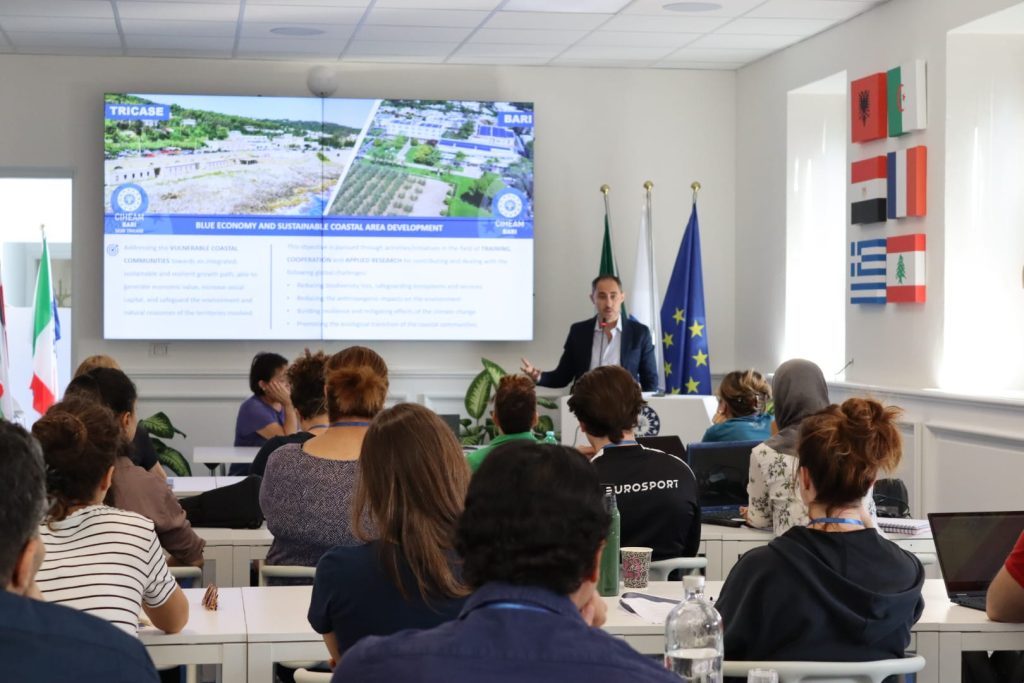
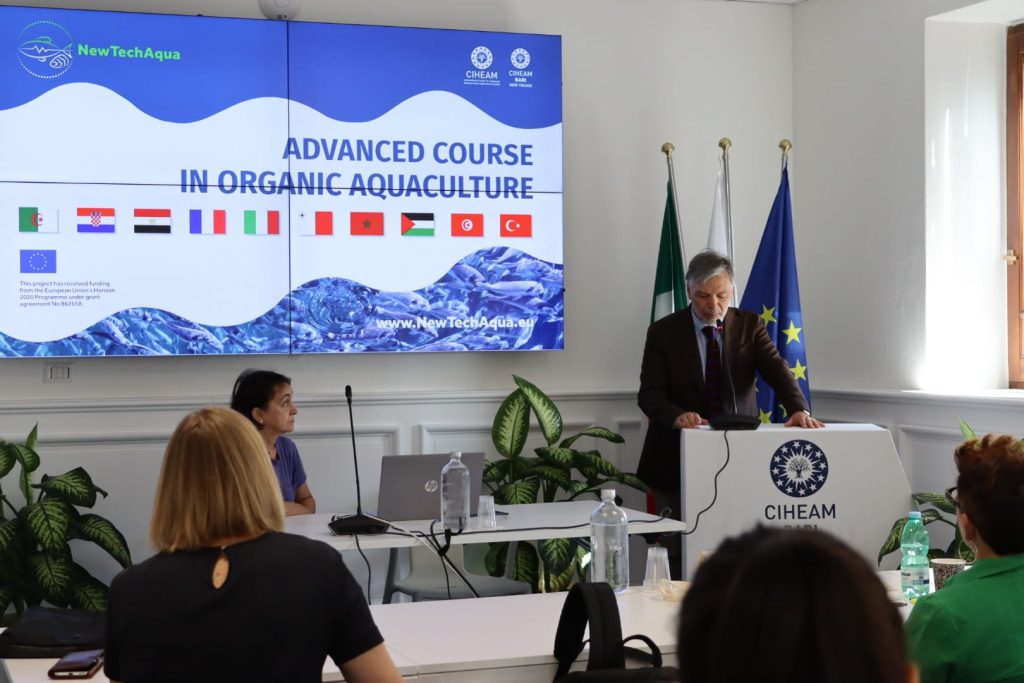
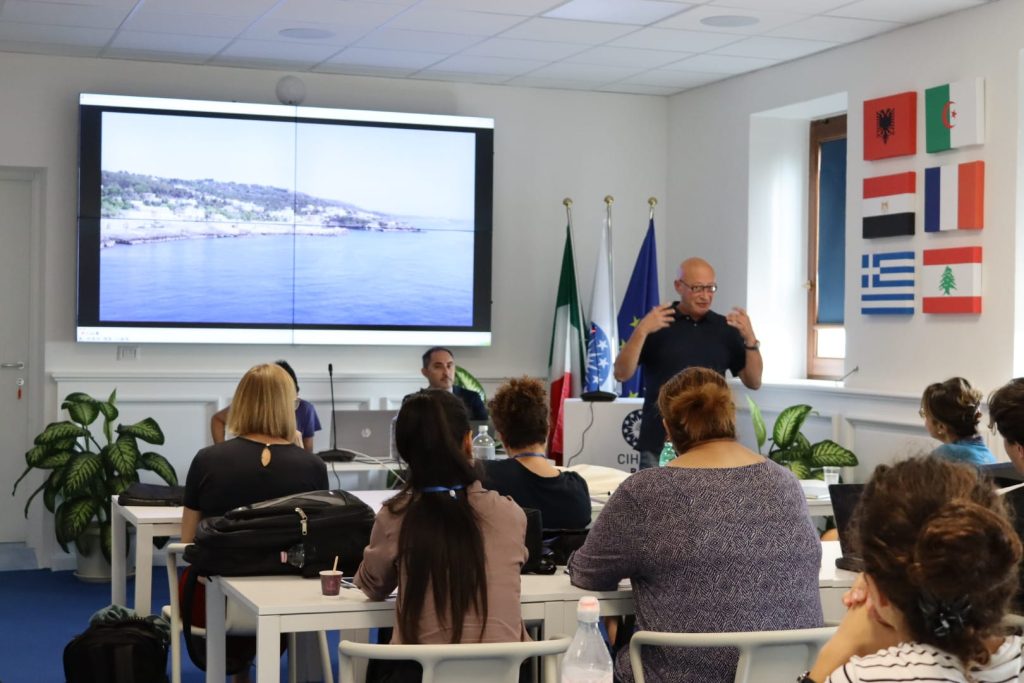
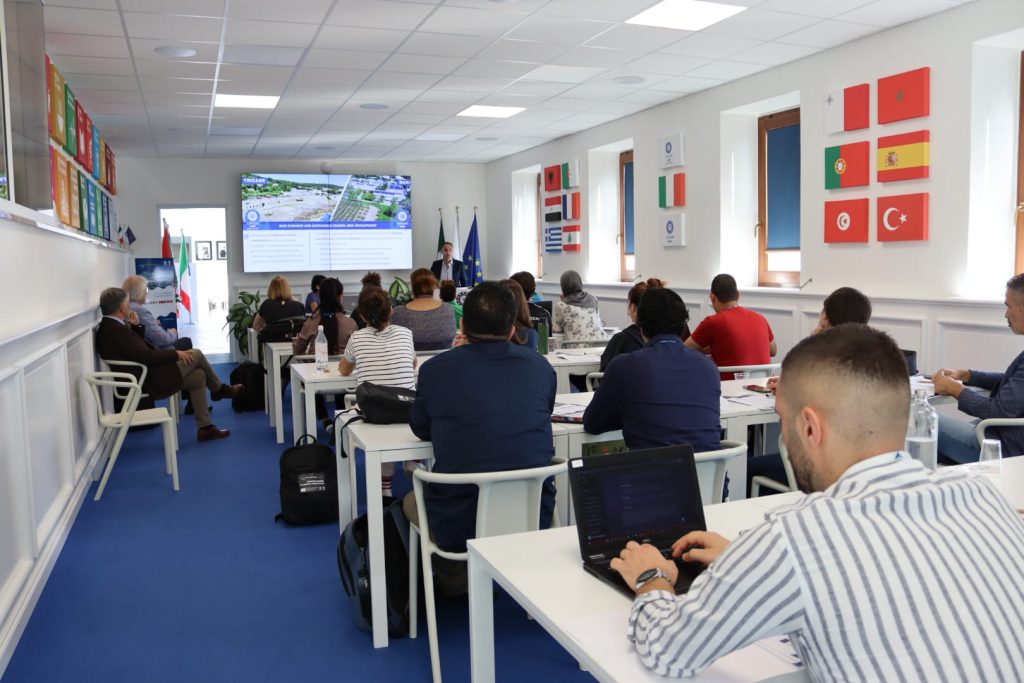
Organic aquaculture in the Mediterranean plays a crucial role in meeting the growing global demand for seafood, while addressing critical aspects related to marine resource conservation and environmental sustainability. In this context, the course on Organic Aquaculture aims to provide a tangible response to these global challenges, combining food security with the need for resource and environmental protection.
The course, which brings together 20 students from various Mediterranean countries, including Albania, Algeria, Croatia, Egypt, France, Italy, Malta, Morocco, Tunisia and Turkey, represents a significant step towards promoting sustainability and innovation in organic aquaculture and developing knowledge and skills that will contribute to a more sustainable future for the seafood industry in the Mediterranean and beyond.
Il CIHEAM Bari annuncia l'apertura ufficiale della Call4Application per i Laboratori di Open Innovation – Design Thinking realizzati all’interno del Progetto di Ricerca “Rigenerazione Sostenibile”, in collaborazione con Almacube (incubatore, acceleratore e hub innovativo dell’Università di Bologna e Confindustria Emilia Centro): una straordinaria opportunità indirizzata a innovatori, start-up, spin-off, aziende innovative, idee progettuali e gruppi di ricercatori che desiderano diventare parte integrante del movimento per la sostenibilità nel settore agricolo. Il programma mira a sviluppare soluzioni innovative per affrontare le sfide cruciali nel settore agricolo.
L'obiettivo del Progetto di Ricerca & Sviluppo "Rigenerazione Sostenibile dell'agricoltura nelle regioni afflitte da Xylella fastidiosa" è affrontare le problematiche che hanno scatenato una delle crisi fitosanitarie più gravi a livello globale, con conseguenze non solo per le imprese agricole ma anche per l'intera comunità.
L’impegno è quello di lavorare insieme con gli innovatori per sviluppare soluzioni che possano promuovere la sostenibilità nell'ambito agricolo e ambientale, anche attraverso l’utilizzo del Venture Clienting, un nuovo modello di cooperazione tra startup e aziende, alternativo al Venture Capital. La via più rapida per sviluppare soluzioni innovative non è più quella di acquistare equity di una startup, ma diventare clienti e usufruire direttamente del suo prodotto. L’azienda identifica, sperimenta e valida soluzioni innovative in modo rapido e poco rischioso, offrendo al contempo alla startup l’opportunità di applicare la propria tecnologia su scala industriale.
I candidati che saranno selezionati avranno l'opportunità di rispondere alle Innovation Challenge proposte dalle aziende della open innovation community costruita nel corso del Progetto “Rigenerazione Sostenibile” del CIHEAM Bari, contribuendo così a risolvere problemi critici e a promuovere la sostenibilità nel settore agricolo. Il processo di selezione comprende una fase di scouting, accelerazione sul campo e co-design in collaborazione con il nostro partner di innovazione, Almacube.
I 5 innovation partner più promettenti avranno l’opportunità di realizzare il proprio progetto attraverso una Proof Of Concept con una o più aziende selezionate. In seguito, potranno stabilire un contratto di collaborazione per portare avanti le loro soluzioni innovative.
C’è tempo fino al 24 novembre 2023, ore 23:59, per inviare la candidatura. Per ulteriori informazioni e per presentare la candidatura: https://www.f6s.com/sustainable-regeneration-program/apply.
Il Progetto di Ricerca & Sviluppo “Rigenerazione Sostenibile dell'agricoltura nei territori colpiti da Xylella fastidiosa” coordinato dal Distretto Agroalimentare di qualità Jonico Salentino (DAJS), è realizzato da Università del Salento, Università degli Studi di Bari Aldo Moro, Politecnico di Bari, Istituto per la Protezione Sostenibile delle Piante del CNR, CIHEAM Bari e Centro di Studi per i Cambiamenti Climatici. I laboratori di Open Innovation sono realizzati dal CIHEAM Bari nell’ambito della Task 5.3 - Open Innovation - Sviluppo di una Infrastruttura Sociale dell’Innovazione.
AGRITECH CALL - RIGENERAZIONE SOSTENIBILE (Landing page)
La digitalizzazione e la Blue e Green economy sono due assi trasversali che accompagnano la rivoluzione che sta avvenendo nel mondo produttivo, e quindi anche nel mondo del lavoro. In questo contesto il ruolo della formazione assurge ad importanza strategica per affrontare i nuovi scenari.
La conferenza “Il design delle nuove competenze, una sfida da cogliere”, che si terrà il prossimo 6 ottobre a Bari, si propone di porre l’attenzione sulle nuove sfide che il mondo del lavoro e della formazione si pone rispetto agli orientamenti del mondo produttivo.
L’Unione Europea ha voluto mettere l’accento sul tema nominando il 2023 quale anno delle competenze. L’obiettivo è quello di approfondire l’argomento del design delle competenze con l’apporto ed il confronto di tutti gli stakeholder del settore, Università, Fondi Interprofessionali, Enti di Formazione, Associazioni del mondo datoriale, Istituzioni e Professionisti al fine di fornire uno spunto di riflessione e se possibile anche un orientamento sul tema per tutti gli interessati e parti attive del processo di evoluzione del mondo del lavoro.
Tra i relatori della conferenza anche Massimo Zuccaro - Amministratore scientifico del CIHEAM Bari, che nel suo intervento tratterà il tema delle competenze nella green e blue economy.
Per partecipare alla conferenza è necessario aderire cliccando qui.
Streaming: https://fb.me/e/WScfVCGN
La creazione di una nuova Area Marina Protetta (AMP) lungo la costa pugliese rappresenta un importante passo verso la salvaguardia dell'ecosistema marino nel Mar Mediterraneo.
I risultati preliminari dell'AMP Otranto-Leuca saranno presentati il 30 settembre, alle ore 11, nella sede di Tricase del CIHEAM Bari. Questa area coinvolgerà 11 comuni e si estenderà per circa 60 km lungo la costa, posizionandosi tra le più vaste d'Europa. L'iter per l'istituzione di questa AMP è stato lungo e complesso, ma ora si sta avvicinando alla realizzazione grazie agli sforzi dei comuni coinvolti e del Ministero dell'Ambiente -con il supporto di ISPRA- e della Regione Puglia attraverso il Progetto CORISMA (finanziato dal FEAMP-PO 2014-2020 - Fondo Europeo per gli Affari Marittimi e la Pesca 2014-2020), insieme con CIHEAM Bari (capofila), Università del Salento e ARPA Puglia, partner del progetto.
L'AMP Otranto-Leuca sarà fondamentale per la conservazione della biodiversità marina e per promuovere lo sviluppo sostenibile delle comunità locali. Gli habitat all'interno dell'AMP Otranto-Leuca sono estremamente sensibili ai cambiamenti climatici e alle pressioni antropiche, rendendo, quindi, necessaria l’adozione di misure di protezione e gestione sostenibile. Questa AMP rappresenterà non solo una salvaguardia per l'ambiente naturale, ma anche un'opportunità per lo sviluppo di attività economiche sostenibili, come il turismo subacqueo e l'enogastronomia.
L'AMP Otranto-Leuca sarà un modello di convivenza armoniosa tra la tutela dell'ambiente marino e lo sviluppo socioeconomico del territorio. Inoltre, contribuirà a sensibilizzare l'opinione pubblica sull'importanza di preservare i nostri mari e oceani per garantire un futuro sostenibile.
L'iniziativa è supportata dal CIHEAM Bari, il centro internazionale di formazione e ricerca che lavora per promuovere l'agricoltura e la pesca sostenibili, la sicurezza alimentare e lo sviluppo delle comunità costiere.
In concomitanza con l’evento, alle ore 19, avrà luogo la BlueLandDay 2023, focalizzata sul tema L’Area Marina Protetta: un’occasione di crescita e tutela del territorio tra Otranto e Leuca.
Il futuro dell'ecosistema marino è nelle mani di tutti noi e l'AMP Otranto-Leuca rappresenta un passo importante verso la sua salvaguardia e il nostro benessere futuro.
From 19 to 22 September, a delegation of managers and officials from the Egyptian Water Service took part in the ‘Study Tour on Water Resources Management in Urban Contexts’. The training programme was designed by CIHEAM Bari, the Italian Institute of the International Centre for Advanced Mediterranean Agronomic Studies and delivered in collaboration with Acquedotto Pugliese and the Department of Civil, Environmental, Land, Building and Chemical Engineering (DICATECh) of Polytechnic University of Bari.
The main focus of the study tour was the transfer of circular economy best practices, in particular the reuse of treated wastewater in agriculture. Acquedotto Pugliese shared its experience in the field of treated wastewater management, while CIHEAM Bari focused on the transition from wastewater treatment to reuse in agriculture. "The reuse of treated wastewater," said Nicola Lamaddalena, deputy director at CIHEAM Bari, "is strategic, especially in southern Mediterranean countries such as Egypt. Of utmost importance for wastewater reuse is the adoption of suitable irrigation methods calibrated for treated wastewater, excluding sprinkler or surface irrigation, and including micro-irrigation methods, such as drip irrigation.
The training programme is part of the ‘Water Knowledge project’ funded by the Italian Cooperation and implemented by CIHEAM Bari in collaboration with, among other institutional stakeholders, the Egyptian Ministry of Water Resources and Irrigation.
This project is an important step towards the sustainable management of water resources and the use of more environmentally friendly agricultural practices. It will thus help build a more resilient and ecologically sound future in the areas involved.
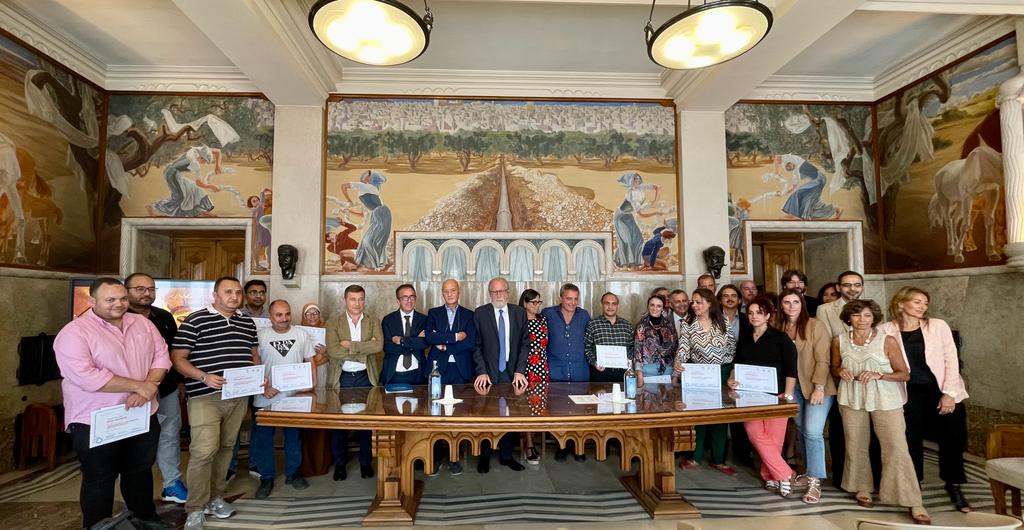
Dal 19 al 22 settembre, una delegazione di manager e funzionari del servizio idrico egiziano ha partecipato allo "Study Tour sulla Gestione delle Risorse Idriche in contesti Urbani”. Il percorso di formazione, che è stato elaborato dalla sede italiana del Centro Internazionale di Alti Studi Agronomici Mediterranei (CIHEAM Bari), è stato realizzato in collaborazione con Acquedotto Pugliese e Dipartimento di Ingegneria Civile, Ambientale, del Territorio, Edile e di Chimica (DICATECh) del Politecnico di Bari.
Il focus principale dello study tour ha riguardato il trasferimento delle migliori pratiche di economia circolare, con particolare attenzione al riuso di acque depurate nell'agricoltura. Acquedotto Pugliese si è dedicato soprattutto a condividere le proprie esperienze nella gestione delle acque depurate, mentre CIHEAM Bari si è concentrato sul passaggio dal trattamento delle acque al loro utilizzo in agricoltura. «Il riuso delle acque reflue trattate –ha sottolineato Nicola Lamaddalena, direttore aggiunto del CIHEAM Bari- è strategico in particolare nei Paesi della sponda sud del Mediterraneo, come l’Egitto. Il nostro focus sull’utilizzo dei giusti sistemi irrigui tarati sulle acque depurate, evitando quelli a pioggia o di tipo superficiale e privilegiando metodi a micro-portata di erogazione, tipo l’irrigazione a goccia, sono molto adeguati al riutilizzo delle acque reflue».
Il percorso di formazione si inserisce nel “Water Knowledge Egyptian-Italian Water Training Programme”, progetto finanziato dalla Cooperazione italiana e realizzato dal CIHEAM Bari in accordo con, tra gli altri, il Ministero egiziano delle Risorse Idriche e dell'Irrigazione.
Questo progetto rappresenta un passo importante verso la gestione sostenibile delle risorse idriche e l'adozione di pratiche agricole più eco-friendly, contribuendo così a un futuro più resiliente e responsabile per entrambe le Regioni coinvolte.
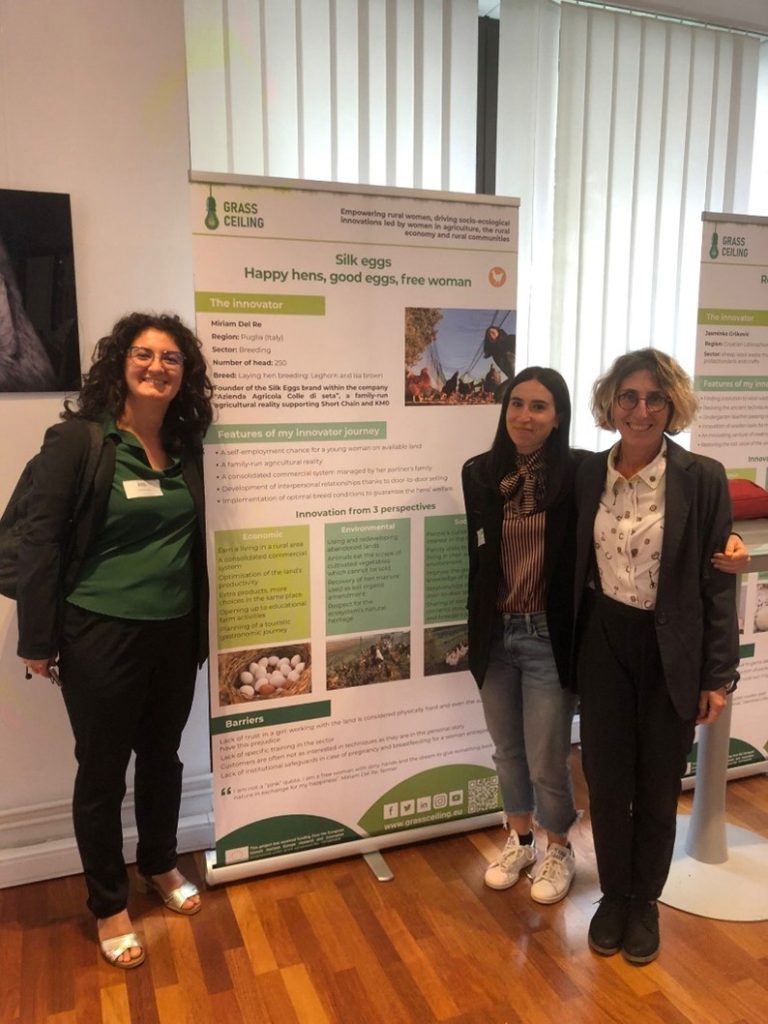
The first annual showcase of GRASS CEILING (Gender Equality in Rural and Agricultural Innovation Systems) a three-year project funded under the European Union’s Horizon Europe programme, was held at Copa-Cogeca's headquarters in Brussels, on 13 September The project aims to support women’s empowerment in rural areas and help create an environment in which women can lead innovation processes to address socio-ecological challenges, thus contributing to the development of those areas and rural communities.
Nine women innovators from the Living Labs set up by the project in different EU countries gathered to share their innovation stories and ambitions, pitch their companies' products and services, and discuss the difficulties they are facing in their personal innovation journey. The nine women innovators were accompanied by the Living Lab co-leaders who introduced the specifics and activities of the nine GRASS CEILING 'living labs'.
The youngest female participant in this first project showcase came from Ruvo di Puglia, Italy. She runs a fresh egg business in partnership with a well-known local family-run agri-food company. She is one of the eight women involved in the Bio-Distretto delle Lame Living Lab, co-managed by CIHEAM Bari and Legacoop Puglia as part of this European project.
Patrizia Pugliese, project manager of CIHEAM Bari, said that the event was a unique opportunity to listen to women's voices telling about the drivers, motivations and obstacles met along their individual innovation pathway and to highlight similarities and differences of the rural contexts in which these pathways are being undertaken. The project partners, the EU authorities and other institutional stakeholders attending the event greatly appreciated the valuable inputs of the showcase, which will further enhance the project's ongoing research activities and inspire future initiatives.
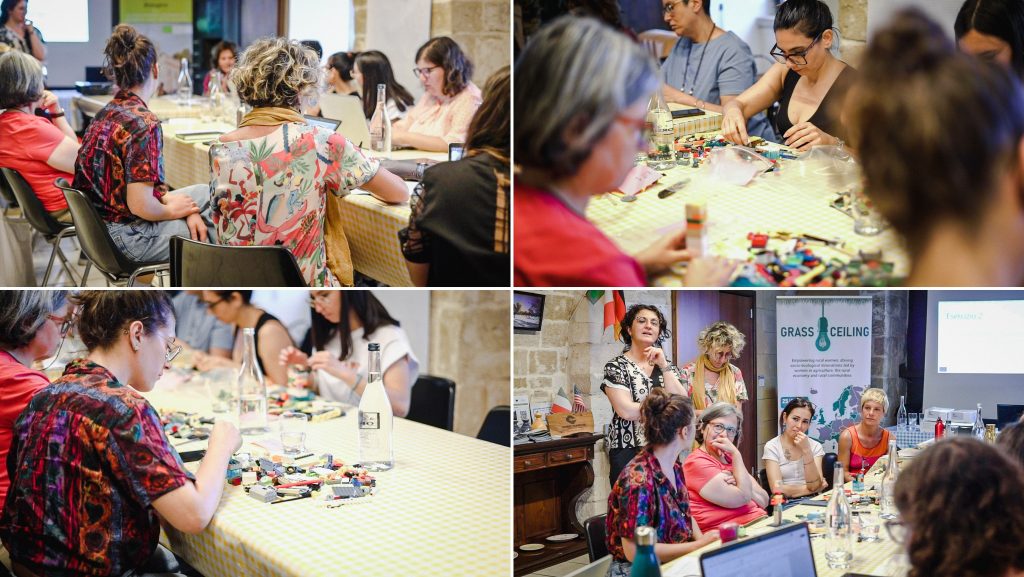

Il 13 settembre scorso nella sede di Copa-Cogeca a Bruxelles si è tenuto il 1° showcase annuale di GRASS CEILING (Gender Equality in Rural and Agricultural Innovation Systems), un progetto triennale finanziato dall’Unione Europea nell’ambito del programma Horizon Europe, che si propone di facilitare l’empowerment delle donne nelle aree rurali e sviluppare un contesto in cui le donne possano guidare processi di innovazione in risposta alle sfide socio-ecologiche, contribuendo allo sviluppo delle stesse aree e comunità rurali.
Nove donne innovatrici provenienti dagli altrettanti Living Labs creati dal progetto in diversi Paesi membri dell'UE si sono riunite per condividere storie e sogni di innovazione, raccontare i prodotti e servizi delle loro aziende e discutere delle difficoltà incontrate nel loro personale percorso di innovazione. Le nove innovatrici sono state accompagnate dai co-leader dei Living Lab che hanno potuto presentare le caratteristiche e le attività dei 9 “laboratori viventi” di GRASS CEILING.
La più giovane partecipante a questa prima vetrina del progetto viene dall’Italia, esattamente da Ruvo di Puglia, e gestisce un'attività di produzione di uova fresche in associazione con una rinomata azienda agroalimentare locale a conduzione familiare. È una delle otto donne del Living Lab Bio-Distretto delle Lame co-gestito dal CIHEAM Bari e da Legacoop Puglia nell'ambito del progetto europeo.
Patrizia Pugliese, project manager del CIHEAM Bari, ha affermato che si è trattato di un’opportunità unica per ascoltare direttamente la voce delle donne sui fattori trainanti, le motivazioni e gli ostacoli dei percorsi di innovazione individuali e per comprendere similitudini e differenze legate ai contesti rurali specifici in cui tali percorsi si stanno realizzando. I partner del progetto, l’UE e le altre istituzioni presenti all’evento hanno molto apprezzato i preziosi input emersi dallo showcase che contribuiranno ad arricchire l’attività di ricerca in corso nell’ambito del progetto e ad ispirare future iniziative.